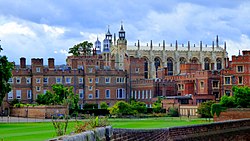Public school
| Oh no, they're talking about Politics |
| Theory |
| Practice |
| Philosophies |
| Terms |
| As usual |
| Country sections |
|
|
Public schools are different things on either side of the Atlantic Ocean. Both sets of schools are heavily influenced by the Prussian schooling model. Introduced in the early 19th century, the Prussian model mandated many appalling ideas, including:
- Education should be compulsory
- Teachers should be trained in teaching (shock! horror!).[note 1]
- Exams should be standardized so that exam results should be comparable.
- There should be a national curriculum so that all pupils learn the same things.
- Mandatory kindergarten
American public schools[edit]
Public schools in the United States are schools paid for by government funds to educate all students in the area for free or minimal cost. People with an axe to grind call them "government schools", which is something of a shibboleth for conservatives as well as libertarians. Because of the First Amendment to the US Constitution, public schools in the US are not allowed to hold religious functions, which tends to get Christian underwear in a twist. Also they tend to want to teach evolution in science class. Apparently that's because evolution is science or something, but this time the twisted underwear mainly belongs to fundamentalists because mainstream Christians don't have such a problem with it. Some radical morons feel that the Department of Education itself is unconstitutional.[explanation nonexistent]
British public schools[edit]
What are known as public schools in America and other countries are called state schools or comprehensive schools in the UK (in England, increasingly now turned into quasi-private academies — a term historically used only in Scotland for state schools — by questionable UK government policies). They are funded by the government and attended by the vast majority of British children.
The term "public schools" is used in Britain to refer to a small number of exclusive (and normally expensive, though there are scholarships) private schools, the most famous being Eton, Harrow, Rugby, Stonyhurst, Ampleforth, Greyfriars and St. Custards.[1][2] Famous public schools for girls include Roedean and St. Trinian's. Exactly what is public about them is a bit of a mystery to someone who didn't grow up with the term, but the name is derived from the time when anyone (the public) could attend, given the cash necessary — most schools at the time of their foundation requiring involvement in the Church before one's son would be admitted.
Traditionally British public schools were boarding schools where parents from the elite would send their sons to get beaten by headmasters, housemasters and prefects. This was believed to be "character-building" (i.e., training in sado-masochism). Today corporal punishment is illegal in all British schools. Public schools often have esoteric traditions dating back several generations; one of the most famous public school traditions, now discontinued, was "fagging" (nothing to do with homosexuality, although reputedly a lot of that goes on at public schools too).[note 2] As is probably inevitable considering the unnatural all-male closed environment, many of these schools are now embroiled in (mostly historical) allegations of sexual abuse of boys, and there have been a number of successful prosecutions of former teachers. Younger pupils used to be selected as "fags", acting as servants to school prefects (an elite group of older students). Until the mid-20th century, prefects had the right to cane or otherwise discipline their fags and other younger pupils. The Duke of Wellington is often quoted as saying that "The Battle of Waterloo was won on the playing-fields of Eton," although it is unlikely that he did, particularly as it didn't actually have any playing fields at the time.
Nowadays public schools are generally regarded as rather elitist, giving rise to the "old school tie" environment in "the City", As any fule kno, "the City" refers to the financial and similar companies/organizations primarily in the City of London (The "Square Mile" — not to be confused with Greater London). Rich parents pay very high fees to get their children (until recently, usually sons) a select education at public schools. There are also public schools for girls (Roedean being the most prestigious) and from the 1970s onwards some boys' public schools began to accept girls at the senior level in the 6th form; today many are fully co-educational, though the most elitist schools of all such as Eton and Harrow are still boys-only. Many British public schools now depend increasingly on students from the international super-rich more than British "old money". The most successful public school students conventionally progress to Oxford and Cambridge Universities (Oxbridge). Today there are a high number of state school-educated students at these universities, but there is still a disproportionately large public school contingent.
Currently, 20 Prime Ministers, including the current recently-deposed Premier Boris Johnson, have attended Eton, 7 Harrow, and 6 Westminster. Interestingly, 43 Prime Ministers attended Oxbridge Universities. As of the 2019 general election, 27% of sitting MPs, 173 of them, attended independent schools. Of those 138 are Conservative MPs and 27 are Labour MPs. Only 7% of the UK population has attended an independent school.[4]
See also[edit]
- Orval Faubus
- Homeschooling — an alternative
- Waldorf education — an even worse alternative (crank magnetism, positive effects of childhood disease)
- Unschooling — an even worser alternative (education is brainwashing)
Notes[edit]
References[edit]
- ↑ Molesworth by Geoffrey Willians & Ronald Searle (1959) Vanguard Press.
- ↑ Mmm, custard.
- ↑ faggot, n. and adj. Oxford English Dictionary.
- ↑ [1]
